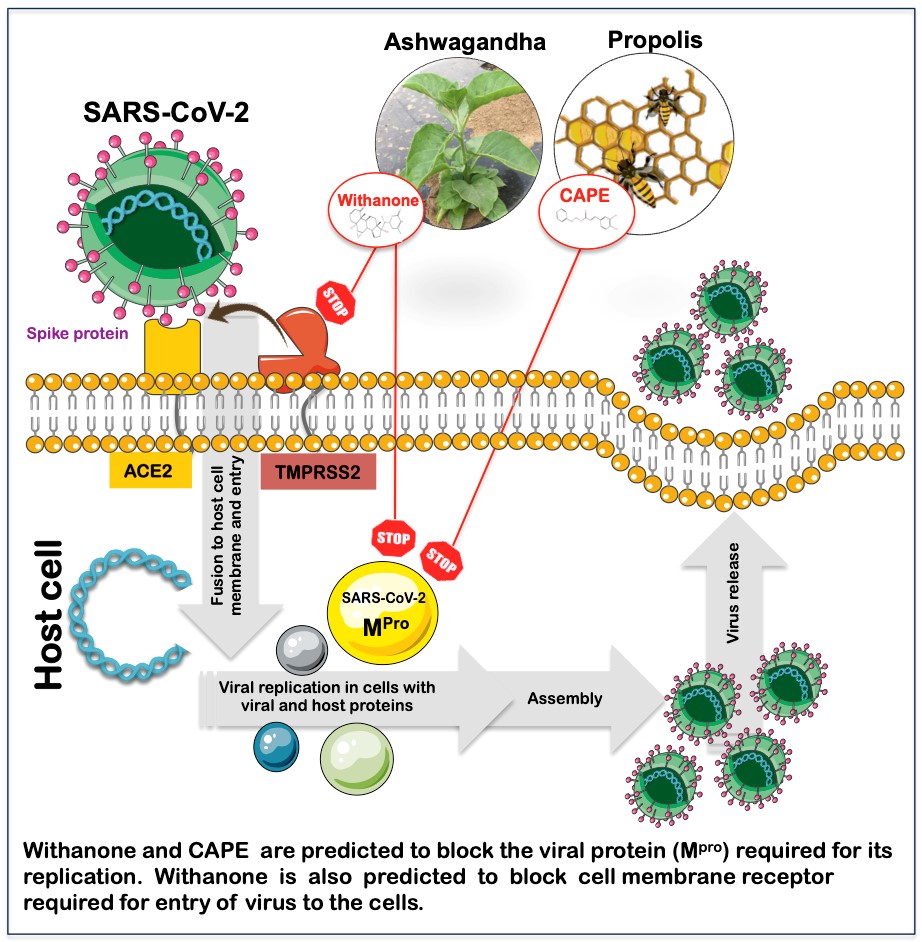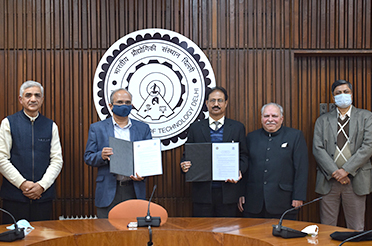Publish Date: 18th May 2020
Ashwagandha takes the lead to be the mother nature’s COVID-19 warrior: Study
Share this on

A collaborative research study by DAILAB @ IIT Delhi and DAILAB @ AIST (National Institute of Advanced Industrial Science and Technology), Japan has recently discovered that Ashwagandha may hold an efficient anti-COVID-19 drug
A novel strain of coronavirus (SARS-CoV-2) that emerged in Wuhan city, China in December 2019 has caused pneumonia outbreak in more than 150 countries called COVID-19. As of May 17, 2020, it has infected around 45,25,497 individuals globally with 3,07,395 deaths, as reported by WHO in its COVID-19 Situation Report - 118.
The outbreak, declared as a Global health emergency on January 30, 2020, disrupted normal life to the extent of calling world almost to a halt. Though some treatment options including the use of Remdesivir, Hydroxychloroquine, Lopinavir, Ritonavir, APN01 or Favilavir are being tested in clinical trials across the globe, yet no effective therapy has been announced. While new line of drug and vaccine development have been initiated world-wide, in the current scenario of high infected numbers, severity of the disease and high morbidity, repurposing of the existing drugs are heavily explored by recruiting integrative genomics and bioinformatics research tools.
SARS-CoV-2 virus genome and structure have been recently published triggering drug designing, devising and development using informatics and experimental tools, worldwide. DAILAB (DBT-AIST International Laboratory for Advanced Biomedicine) teams @IIT Delhi and @AIST Japan, working on natural compounds from Ashwagandha and propolis for last several years, explored the possibility of some of their bio-actives to interact with SARS-CoV-2.
In a research paper, just accepted for publication in the J Biomol Struct Dyn, the team has reported that natural compounds from Ashwagandha and propolis have the potential to be effective anti-COVID-19 drug candidates. The researchers targeted the main SARS-CoV-2’s enzyme for splitting proteins, known as the Main protease or Mpro that plays a key role in mediating viral replication. This is an attractive drug target for this virus, and as humans don’t naturally have this enzyme, compounds that target Mpro are likely to have low toxicity. They discovered that Withanone (Wi-N), a natural compound derived from Ashwagandha (Withania somnifera) and Caffeic Acid Phenethyl Ester (CAPE), an active ingredient of New Zealand propolis, have the potential to interact with and block the activity of Mpro. The team described that they have also searched for the capability to these bioactives to modulate the protein on the surface of human cells, to which the SARS-CoV-2 binds and allows its entry into our cell - the transmembrane protease serine 2 (TMPRSS2), and selected Withanone. The study is currently under review and expected to be published in a near future.
The team said that their findings may not only connect to save time and cost required for screening for anti-COVID-19 drugs, but may also offer some preventive and therapeutic value for the management of fatal COVID-19 pandemic, and hence warrant prioritized validation in the laboratory and clinical tests. They added that the drug development may take a while and in the current scenario, these natural resources (Ashwagandha and Propolis) may offer some preventive or even therapeutic value. However, although they are easily available and affordable, one has to be cautious about the content of bioactive ingredients. CAPE, while is a major component of propolis, its amount and stability are critical factors that could be managed by generating its complex with cyclodextrins. This has been earlier described by the DAILAB team. Withanone, on the other hand, varies with geography/parts/size of the Ashwagandha plant. So, in order to acquire or appreciate particular effects, we must use the right and quality-controlled resource/extracts.
Prof. D. Sundar, Coordinator of DAILAB @ IIT Delhi & Head of the Department of Biochemical Engineering and Biotechnology at IIT Delhi said, “The traditional medicine system ‘Ayurveda’ has been practiced for thousands of years in India. Unlike modern medicine, the mechanism of action of natural drugs has not been resolved so far. IIT Delhi and AIST researchers have been working together for more than a decade and trying to contribute to strengthen this avenue by merging the traditional knowledge with the modern technologies.”
He added, “While well-trusted reputation of Ashwagandha as an immunity enhancer forms a basis of the recent initiative of the Indian Government in forming an Interdisciplinary Task Force [joint initiative of Ministry of AYUSH, Ministry of Health and Family Welfare (MoHFW), the Ministry of Science & Technology through Council of Scientific & Industrial Research (CSIR) with Indian Council of Medical Research (ICMR)] to launch its clinical research studies related to SARS-CoV-2 and the COVID-19 disease, the current research report of this team provide hints on its direct anti-viral activities.”
The other authors on this paper were Vipul Kumar (PhD student, IIT Delhi) and Jaspreet Kaur Dhanjal (PhD alumni from IIT Delhi and currently a post-doctoral fellow at AIST).
Prof. Sundar said that they could not accomplish these findings without the effective collaborations with Dr. Renu Wadhwa (Prime Senior Research Scientist and Head of AIST-INDIA DAILAB) and Dr. Sunil Kaul (Senior Research Scientist, AIST-INDIA DAILAB) of National Institute of Advanced Industrial Science & Technology (AIST), Tsukuba, Japan.
Bibliographic information: Vipul Kumar, Jaspreet Kaur Dhanjal, Sunil C. Kaul, Renu Wadhwa and Durai Sundar (2020) Withanone and Caffeic Acid Phenethyl Ester are predicted to interact with main protease (Mpro) of SARS-CoV-2 and inhibit its activity. J Biomol Struct Dyn.
Prof. D. Sundar, Coordinator, DAILAB & Head of the Department of Biochemical Engineering and Biotechnology, IIT Delhi: http://web.iitd.ac.in/~sundar








